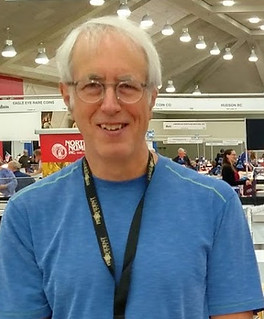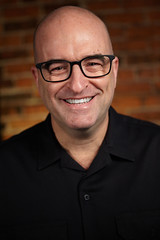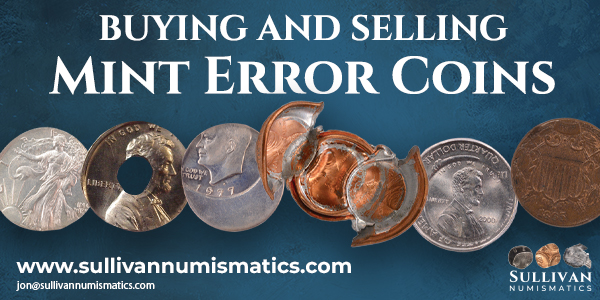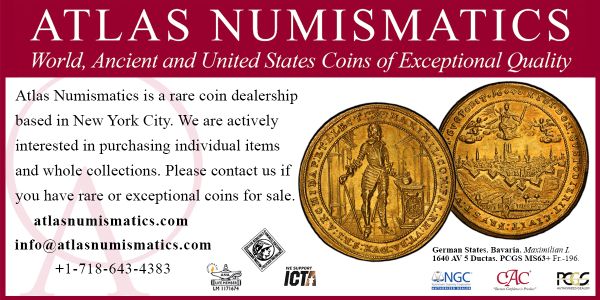
PREV ARTICLE
NEXT ARTICLE
FULL ISSUE
PREV FULL ISSUE
TOM CALDWELL INTERVIEW, PART FOURGreg Bennick's latest interview for the Newman Numismatic Portal is with Tom Caldwell of Northeast Numismatics. Here's the fourth of four parts, where Tom discusses his advice to new coin dealers. -Editor GREG BENNICK: So, we'll hold out hope for that. I was going to ask you, what advice would you give to somebody interested in becoming a coin dealer? What advice would you give to somebody who was just thinking of getting started in it or maybe just starting on any level? What advice would you give?
GREG BENNICK: For sure. He's been great with young numismatists. TOM CALDWELL: He's paid all the tuition and everything and if they're younger, he's had to pay for the parents to go there. He's had good intentions and that's working out. And along those lines, we have seen, if you had asked me a couple of years ago about new people in the business, I would say it's not really seen. I would never come out and say that the coin business is going down the tubes because there aren't any people. But there's been a lot in the last couple of years that have come out. We've seen at the shows and basically, if the young person has the interest if they're smart, they know what, you can have a coin business online and so we think the future is promising for the coin business with many young people getting involved. GREG BENNICK: That's great, what about young collectors? Just in case there's young collectors watching this, what advice would you have for people getting started in coin collecting? Not even necessarily young collectors, what if there was a 60-year-old or a 30-year-old didn't necessarily get involved in coins for the first time. What advice would you have for coin collectors? TOM CALDWELL: Well, I think it would be similar advice to go to a show. Learn about the history of coins and just continue from there. Find an area that you really enjoy. You want to collect a set of Morgan dollars or a type set of U.S. coins or paper money interests you or mint errors or whatever. Just find something that really strikes you and study it. You can't necessarily learn it all unless you're really in it full-time and so forth but find something that's an area that really strikes you. GREG BENNICK: I think it's important to have that connection to it. And whatever it might be, a different way of thinking about it. Yeah. Draws you to coins. I know that for me, I ended up collecting things that my father had collected, and whatever it might be for folks, I think it's important to have that draw, personal draw to the coins. You're not just doing it by rote per se, but rather have an actual emotional or personal or historical collection to what you're collecting. TOM CALDWELL: Too many people, it's easy to have a learning curve, which is understandable. It is understandable to have a learning curve. They might come in to see us at some point after they've been collecting for X number of years, and they've got a couple of Buffalo nickels and a few Liberty Standing quarters. And maybe they thought they were being smart, and they could outsmart everyone else online, and they bought a third world grading service coin. And they finally have a focus. So, it's good to have a focus on just what you want to do, not just necessarily be random about what you buy.
TOM CALDWELL: Well, I remember being at a Bowers and Merena sale and buying a, I believe this was right at the start of grading or a little bit before, buying a gem-proof Stella. And the dealer next to me says, is that the first one of those you own? I said, yes. So, then I bought the next one, the next lot. It was the second one I owned. (laughter) That comes to mind. Recently, we've had a couple of Pan Pac $50 gold pieces a round and an octagonal. Those are things that I can think of that is really always fun to own. Those are the type of coins that it's been said that people, once they've been collecting for a while, maybe in the long run, they should just get, let's say ten or let's say twenty different really cool coins they should own. We did a trade recently with a customer that we met in the lobby at Long Beach and he traded about 25 coins, plus a cheque payment for our Pan Pac $50 gold piece that we had. And that was going to be one of his really outstanding pieces that he's going to hold on to for long term. So those are a couple that come to mind.
GREG BENNICK: That's nice. I like that kind of collecting with TOM CALDWELL: Well, yeah, I'd say one that comes to mind is the 1913 nickel. I remember back in the 80s, it was me and Larry Whitlow and a couple other dealers. We were trying to form a consortium to buy it if it sold for X amount of dollars. I think it was only about $300,000, $400,000 at the time. And of course, we didn't come close. But that's one that I've always liked. Also, I think an undervalued rarity is a 76-CC twenty cent piece. It's about a million dollar plus coin right now. Always liked that. There was very few known. Those are two that come to mind.
GREG BENNICK: That's great. Well, I like hearing this. Well, I appreciate all the
things that we've talked about so far. We've covered a bit about history. We've
covered a bit about the present and how things have changed over time. Is there
anything else that I've missed in the course of thinking about what to ask you
today? I just want to give you the opportunity to say, TOM CALDWELL: Well, you probably have, but not that I could think of right off hand. (Laughter) Nothing that comes to mind right now. GREG BENNICK: Okay, no problem. Well, we can always do a part two at some point, if you like. I certainly am going to be doing some follow-up interviews with some of the folks I've interviewed in the past. Is there a general coin show schedule that you follow? If people want to meet you in person, if they want to talk to you, see the coins that maybe they haven't seen online already, or even if they have, see them again. Is there a general list of coin shows that you always go to? TOM CALDWELL: Well, we've been for close to about fifty years now, we've been to every Long Beach show. That's three times a year. Although, frankly, it's creeping into our mind to maybe skip one because it's not the prominent show that everybody has to go to like it used to be. There's a couple of regional shows here in Manchester, New Hampshire that Ernie runs. There's the Baltimore show three times a year. Central States in the spring, which is our next major show at this point. Those are the major ones that we go to. And we've had a couple of club shows, like the one, in St. Louis in February, which is a fun show to go to. Probably a couple of those I'm not thinking of, but those are the ones that are kind of ones we always go attend. GREG BENNICK: Yeah, great. Well, that's a good list. You know, I've always thought about dealers like yourself who go to so many shows. There must be, you know, there has to be a cap or a limit at some point between, or rather not a cap or a limit, but there has to be a figuring out of expenses because it's expensive to fly to shows and what not and insure coins, that sort of thing. There has to be at some point a figuring out, of course, of what shows are the ones that do the best and so that you can actually make up and exceed your expenses with profit. I can only imagine that's a tricky thing. TOM CALDWELL: And that comes into play all the time. Expenses have gotten more expensive all the time, more expensive to travel. And sometimes we're better off just spending our time in the office. We get a lot of, we're always busier in the office and making efforts to buy back coins from collectors. And so, it's something we're thinking of all the time. GREG BENNICK: Okay. Well, Tom, thanks so much for spending some time today. You and I can stay online for a few moments after we stop recording here, but I just wanted to say to everybody, if you're interested in Tom and the coins that he has for sale, go to www.northeastcoin.com and check out the entire inventory there. And then in addition, if you'd like to see others of these interviews, be sure to check those out as well and let people know that this is an ongoing series of interviews with numismatists from around the world in all different states of how you'd say with all different states of history, meaning some people who've been involved in the hobby for fifty years, some people who've been involved for less, but all of whom have different areas of expertise that I'm going to be wanting to explore with them. So, thanks so much for watching and Tom, thanks for spending a few minutes today. I really appreciate it. TOM CALDWELL: It's a pleasure. Keep up the good work. GREG BENNICK: Thank you.
To watch the complete video, see:
To read the complete transcript, see:
To read the earlier E-Sylum articles, see:
Wayne Homren, Editor The Numismatic Bibliomania Society is a non-profit organization promoting numismatic literature. See our web site at coinbooks.org. To submit items for publication in The E-Sylum, write to the Editor at this address: whomren@gmail.com To subscribe go to: https://my.binhost.com/lists/listinfo/esylum All Rights Reserved. NBS Home Page Contact the NBS webmaster 
|




